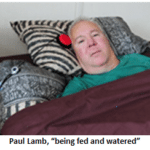A life not worthy to be lived?
NOTE this article is outdated. There is a more recent blog on this topic here.
“I am in pain every single hour of every single day”.
Paul Lamb, severely injured in a car accident in 1990, has made this statement repeatedly. He has almost zero  movement, needs 24 hour care and states that his life consists of “being fed and watered”. Here in the UK Paul Lamb continues to fight a case for the right to die that was begun by the now deceased rugby player and corporate manager Tony Nicklinson. Nicklinson suffered a stroke in 2005 that left him suffering from “locked in syndrome”, paralyzed from the neck down. Although he passed away in 2012 his right to die case is still being pursued in the courts by his widow working in partnership with Paul Lamb.
movement, needs 24 hour care and states that his life consists of “being fed and watered”. Here in the UK Paul Lamb continues to fight a case for the right to die that was begun by the now deceased rugby player and corporate manager Tony Nicklinson. Nicklinson suffered a stroke in 2005 that left him suffering from “locked in syndrome”, paralyzed from the neck down. Although he passed away in 2012 his right to die case is still being pursued in the courts by his widow working in partnership with Paul Lamb.
The UK Supreme court ruled this month (June 2014) against Paul Lamb and Mrs Jane Nicklinson by 7 to 2. in their right to die appeal BUT crucially the judges stated unequivocally that parliament must now act. In July there will be a full debate in the House of Lords on Lord Falconer’s bill which would enable doctors to prescribe lethal doses of drugs to terminally ill patients with a “settled intention” to end their lives. The two new issues this case has highlighted in particular:
- The claim that the law which criminalises helping a person to end their own life is incompatible with the human right to a private life — and this claim was supported by the court in principle.
- There is a move to make it lawful for a doctor or nurse to travel with a patient abroad to die with the help of a suicide organisation in those cases where the patient’s family members feel unable to do so — could this lead to pressure on medics to assist in end of life procedures?
In the previous hearing (Summer 2013) the UK Appeal Court ruled unanimously against the two. Judges said the men had “permanent and catastrophic physical disabilities” but the issue of euthanasia “raises profoundly sensitive questions about the nature of our society.” The judges wrote that “Parliament represents the conscience of the nation” and law courts had no jurisdiction to challenge the UK ban on euthanasia..
But — Is there such a thing as a life not worthy to be lived?
This single question formed the agenda for a small discussion group which came together to discuss the ethics and the draw of euthanasia and assisted dying. Sadly cases such as Paul Lamb and Tony Nicklinson are becoming more common driven by advances in medical technology, and what was once a discussion restricted to the fringes of society is becoming a mainstream topic in our developed and aging populations.
The terms most often used are “assisted dying” and voluntary euthanasia. In this article both terms are used interchangeably. Currently the vast majority of countries do not provide a legal framework for enabling people to end their lives. Notable exceptions include The Netherlands, Switzerland, and the state of Oregon – which we will return to.
Stats and Facts For Mercy Killing
A few initial statistics are useful to consider. The following findings are quoted from UK sources but are actually reflected in many developed economies. They strongly support a case for legalised euthanasia.
Between 1991 and 2001 life expectancy increased by 2.2 years. Sounds great. However in the same period, healthy life expectancy increased by only 0.6 years. Thus the enduring effect of technological innovation seems to be a longer and longer period at the end of our lives during which we can expect to be chronically ill.
In 2006, the UK Government Actuary Department calculated that in 70 years’ time there will be many thousands of Britons aged over 110 — and these issues will take centre-stage.
Most telling of all, in a number of surveys over 80% of people state that they are in favour off assisted dying / voluntary euthanasia.
So what happened during the discussion? The group included a medic who had dealt with people requesting end of life procedures, a member of a pain-management group where end of life discussion is not unusual, a church pastor accustomed to ministering to the chronically sick, and others who had lost loved ones prematurely, as well as several of us who simply wanted help thinking through these issues.
In general there were very strong arguments against legalised euthanasia. One important argument that many Christians (and people of other faiths) tend to present focuses on the “sanctity of life” – that life is given to us by God and essentially it is not for us to play at God. However, as one person said: it cannot simply be length of life that is sacred, what about quality of life? Why is that not also sacred?
A second, very practical point made was around the fact that in some cases people requesting end of life procedures later changed their views, having somehow learnt to manage their situation. This process may have taken many months but is a powerful argument, although it is difficult to state unequivocally that, based on this, nobody should have the right to determine their time of death.
One person went so far as to say that people who take the euthanasia route are doing great damage to the lives of others facing similar situations by asserting that such a life, in fact, is not worth living.
Licence to Kill = Duty To Die
However the most often quoted argument against assisted dying is that of procedural deterioration – known to most of us as “the slippery slope”. Here the case is made that it is all very well for the “chattering classes”, the educated, articulate, and established middle classes, to appreciate the discussion on assisted dying and make their own decision; but what about those in vulnerable situations who, perhaps to relieve perceived stress on family, genuinely feel a “duty to die”? Or in fact what about those who are not ill at all but neglected to the point where this becomes the least evil option?
Against this, evidence from studies performed in Oregon and The Netherlands (see reference below) appears to be definitive. In the ten plus years of these states passing laws for legalised euthanasia there has been no discernible slippery slope. There is no evidence of people being pressured into end of life decisions that were not theirs. On the contrary there is evidence of families actually persuading loved ones who wanted to end their lives, not to do so. Importantly also, it seems that people in the awful position of prolonged pain who proceed down this path in most cases do not actually want to die. They want the option to die if at some later point their suffering exceeded their desire to continue. In most cases the right to die is not actually exercised.
Other arguments for euthanasia / assisted dying focused on free will, and of course on compassion and the good that can be brought by removing suffering.
Any Conclusion?

So was there any conclusion? Not really. My own view is that UK law is in a difficult place but it may be the right place at least at this time. Assisted dying is not legal but nobody to date has been prosecuted if, acting in that person’s interest, they assisted a loved one to travel to a clinic to end their life.
Would you agree?
This article draws from Paul Badham’s excellent book “Is there a Christian Case for Assisted Dying”.
If you found this helpful try the series Why Does God Allow Suffering?

Interesting article Chris. Having witnessed one person die and seen the aftermath of the death of another I can say that both experiences were extremely traumatic for everyome concerned even though both people had an assurance of faith — they knew where they were going!
For me I am against assisted suicide for a whole host of reasons that are already well aired. I dont really think the courts are the place to debate the issue — it is for parliament to legislate and for courts to apply the law.
Hi Tom. That is also my “default position”. However I believe on this topic individual cases need to be looked at, individually. Appreciate your comments.
“A life not worthy to be lived”…not the same as “A life not worth living”? — from the title I thought this might be about capital punishment :-O
Hi Ted. Did think about the title — in the end chose one with more of a ring to it, hoping the lines immediately below would explain. .… But now you know what its about, what do you think? 🙂